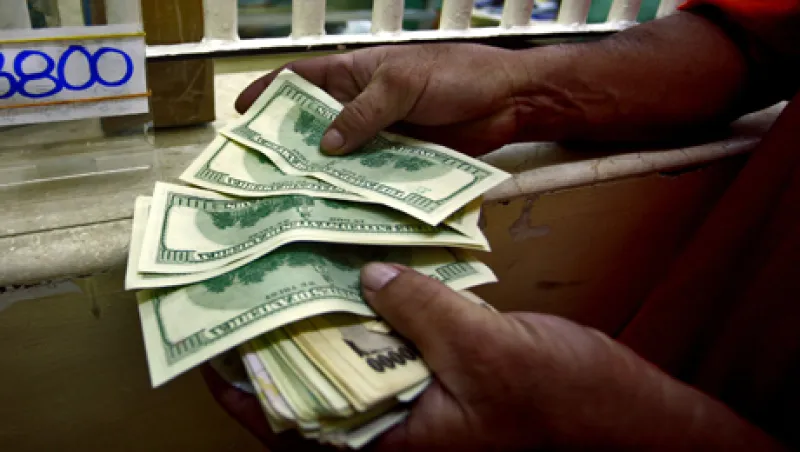THANKS TO THE RISE OF HIGH FREQUENCY TRADING in foreign exchange markets, many smaller banks have found themselves squeezed out of buying and selling major currencies like the euro and the British pound. Those banks are concentrating on higher-profit trades in emerging-markets currencies and developing other businesses where they have a competitive advantage. High frequency traders have had the same effect on foreign exchange that the conversion from eighths to penny increments had on equity trading, says Marc Chandler, global head of currency strategy at Brown Brothers Harriman & Co. in New York. Major currency pairs now get quoted to an extra decimal point. For combinations such as the U.S. dollar and the euro, that means banks are trading on thousandths of a euro cent.
“We found that spreads between bid and asked are narrowing at 9 percent a year, and high frequency trading is accelerating that process,” Chandler says. “We have to grow our volume by 10 percent a year just to break even, which is harder and harder to do because it’s like compounding in reverse.”
In their 2010 paper on foreign exchange, economists Michael King of the Bank for International Settlements and Dagfinn Rime of the Norwegian central bank noted that high frequency trading on electronic networks is marginalizing small firms. “The tight bid-ask spreads and guaranteed market liquidity on such platforms are making it unprofitable for smaller players to compete for customers in the major currency pairs,” King and Rime observed. “Increasingly, many smaller banks are becoming clients of the top dealers for these currencies, while continuing to make markets for customers in local currencies.”
Sang Lee, managing partner at Boston-based research firm Aite Group, estimates that high frequency trading accounts for 36 percent of the $4 trillion–plus daily turnover of foreign exchange globally. But in contrast to the equity market, where high frequency trading is the domain of specialty firms, proprietary trading shops in foreign exchange must now compete with big banks like Deutsche Bank, JPMorgan Chase & Co. and Royal Bank of Scotland Group. Those players all have specialty platforms that allow customers to participate in their algorithmic trading, much of which is high frequency. The banks act as market makers by setting prices.
Lee thinks multinational companies, investment firms and other traditional buyers of foreign exchange will keep relying on smaller banks because they provide credit and other key services. In turn, smaller banks use their big counterparts’ high frequency platforms.
Ed Mount, an American who became London-based head of FX technology-based trading for RBS last September, says his bank’s expertise in algorithmic trading has attracted many new customers, including smaller banks that used to be rivals. “We’re market makers to them now,” Mount notes. “They aggregate prices from larger banks, and then they provide a personal relationship with their clients. We’re giving them more and more of our tools as well, and they are an important distribution mechanism to us.”
Computerized trading is also drawing clients like investment managers with large portfolios of foreign shares that need to hedge currencies quickly using thousands of pieces of data, Mount says. The algorithms are instrumental in performing gamma hedging, a type of portfolio rebalancing based on price movements of the underlying securities.
Besides compressing spreads, high frequency trading makes it more profitable for proprietary shops like Chicago-based Getco and Austin, Texas–based RGM Advisors to do thousands of small transactions, shrinking the size of individual trades.
Many firms for which trading Group of Ten currencies is no longer worthwhile are choosing to specialize in emerging-markets currencies, where spreads are much wider, BBH’s Chandler says. “If you give a bank a choice between doing $10 in Brazilian reais and $100 in euros, they will make more money in $10 worth of reais than in $100 worth of euros,” he asserts. “It’s not the volume; it’s how wide the spread is.” • •






